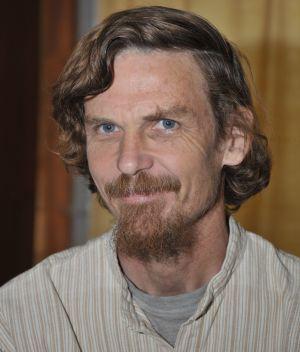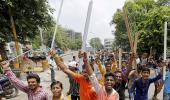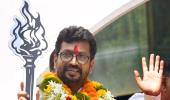'If we want real democracy, the economy itself will need to be democratised.'

Are economic disparity, poverty and unemployment the real issues confronting India this election?
"The growth of wealth disparities is not new, but it was almost certainly reinforced in the last ten years by economic policies favourable to big business, such as corporate subsidies, loan waivers, land concessions, protective tariffs, stimulus packages and relaxation of environmental norms."
"Gautam Adani's meteoric rise under Modi is just the tip of that iceberg. All this is being done in the name of employment and poverty removal, but that's just a fig leaf," Professor Jean Dreze, the eminent Belgian born Indian economist and social scientist, tells Rediff.com's Shobha Warrier.
You have closely watched India for more than four decades. What is the biggest problem India faces now: Unemployment, poverty, inequality between the rich and the poor, or corruption?
These problems are all interconnected.
If you force me to choose one, I might say poverty, because it ruins the lives of so many people.
An impression is often created that India is now a prosperous country, but nothing is further from the truth. It may be one of the largest economise in the world, but that's mainly because the population is so large.
In per-capita terms, it is still a very poor country.
On top of that, income disparities are humongous. So, life at the bottom is really miserable.
But if we want to do something about poverty, we have to ask why it is so resilient, and that leads us to other problems you have mentioned, such as unemployment, inequality and corruption.
We can add others, including caste discrimination and the dismal state of the schooling system.
I would even add the collapse of democracy, because that deprives people of any say in public policies.
The collapse of democracy in India is also a huge concern in its own right. So, we are not short of problems that compete for the top spot.
The BJP is using the Ram Mandir at Ayodhya as the trump card in this election.
Do you think even when people have no job and there is no food on the table, the feeling of being a 'proud Hindu' will make them forget all their problems and vote for the BJP to bring it back to power?
I am not convinced that the Ram Mandir at Ayodhya is the BJP's trump card. In fact, we don't hear much about it these days. The BJP knows better than to count on a mandir to win elections.
Poor people tend to very practical in their voting decisions. They want to know what they are likely to get from different parties.
Sometimes, they may also think in terms of larger issues, such as democracy or India's standing in the world.
But the main issue is whether this or that party is likely to do something for them.
The answer begins with the caste or community of the candidates, because people know that a leader from their own community is more likely to do something for them.
The anti-incumbency factor is also driven by frustration with the ruling party's record in this regard.
One qualification, however, is that the means of propaganda are more powerful than ever today.
This makes it possible to distract people from their real problems and create artificial issues.
Even then, however, I doubt very much that something as nebulous as Hindu pride can sway many voters.

Modi's reaction to the Congress manifesto was, it had the imprint of the Indian Muslim League.
Do you think people are divided on religious and caste lines like never before?
This reaction was as pathetic as it was ominous. If you have a sound argument, you don't need to make this kind of silly allegation.
I wish we could laugh about it, alas this silly comment is just one of a series of communal statements from the prime minister that have given the elections a very ugly turn.
The prime minister, who is also the BJP's star campaigner, sets the tone for other BJP campaigners, and he knows it.
His repeated communal statements, therefore, are extremely worrying. They indicate a deliberate attempt to incite people against Muslims as an election tactic. Nothing could be more revolting.
So, it is not so much that people are divided, but that they are being divided.

How do you compare the manifestos of the BJP which relies totally on Modi ki Guarantee, and the Congress which talks about some real issues haunting the country now?
I think that both manifestos talk about real issues, but their approach is different.
The Congress manifesto includes many specific promises of social benefits.
For instance, it promises cash transfers of Rs 1 lakh per year for every poor family, an urban employment guarantee programme, free healthcare at all public health centres, and other things of this sort.
You may or may not believe the promises, but they are there, and some at least have credibility.
The BJP manifesto is much more restrained in this regard. It is high on rhetoric, but low on specifics.
For instance, it promises quality education for all, which sounds great, but it doesn't say how this lofty goal is to be realised.
We must read this contrast in light of the fact that the BJP has explicit reservations about social benefits or what it calls revdis (freebies).
The BJP is not promising freebies, it is promising that India will be a developed country by 2047 with everyone on board.
This promise might cut some ice if the NDA government had a good development record, but that is not the case.
Compared with the preceding ten years, GDP growth slowed down under the NDA, the growth of household expenditure slowed down even more, and the growth of real wages came to a virtual standstill.
The latest poverty estimates suggest that the headcount ratio, that is, the proportion of the population below the poverty line, was declining by two percentage points per year between 2004-2005 and 2011-2012, but less than half a percentage point per year after that.
The monumental blunder the NDA made in 2016 with wholesale demonetisation is not a very good precedent either.
In short, there is no reason to bet on the NDA for faster development.

22.6% of the country's income has gone to the top 1% which is the highest proportion in the last 100 years.
And the top 1% owns 40.1% of wealth. While India has the world's third highest number of billionaires, India ranks 111 out of 125 countries in the Global Hunger Index.
Do you think India's wealth is being transferred to the big corporates in the last 10 years?
Your figures seem to be based on the recent work by Anmol Somanchi and his colleagues, including Thomas Piketty. That is indeed the most authoritative source as things stand.
It shows that income and wealth disparities have shot up in the post-liberalisation period, as one might expect.
During the last ten years, wealth disparities have shot up further, reaching their highest level since independence.
The growth of wealth disparities is not new, but it was almost certainly reinforced in the last ten years by economic policies favourable to big business, such as corporate subsidies, loan waivers, land concessions, protective tariffs, stimulus packages and relaxation of environmental norms.
Gautam Adani's meteoric rise under Modi is just the tip of that iceberg.
All this is being done in the name of employment and poverty removal, but that's just a fig leaf.
The truth is that corporate interests have a big influence on public policy.
 IMAGE: Professor Jean Dreze
IMAGE: Professor Jean DrezeWith the Electoral Bond scam out in the open, do you think, not just the country's wealth, democracy is also controlled by the big corporates? How dangerous is this for the country's future?
I would not say that democracy is entirely controlled by big business, but big business certainly has an enormous influence.
Further, most of that influence is of an illegitimate or objectionable kind, even when it is not illegal.
For instance, business is grossly overrepresented in all sorts of advisory boards and consultation processes.
On top of that, there are plenty of illegal influences by means of bribes, kickbacks, quid pro quo, and so on.
None of this, of course, is restricted to India.
Around the world, big business is a threat to democracy. In fact, it is more than a threat.
Concentration of power is the anti-thesis of democracy.
I don't see how democracy can flourish when a privileged minority has so much power.
So, if we want to real democracy, the economy itself will need to be democratised.
This may sound like a pipedream, but there have been many inspiring efforts to democratise the workplace around the world.
In India itself, initiatives like the AMUL cooperative, Lijjat Papad, India Coffee House and the Uralungal Labour Contract Co-operative Society have shown that many enterprises can be run in the interest of workers and the public instead of enriching a boss.
The challenge is to create an enabling environment that promotes the growth of democratic enterprises.
Taxing billionaires is not a bad idea, but dispensing with them would be even better.
Feature Presentation: Aslam Hunani/Rediff.com











 © 2025
© 2025